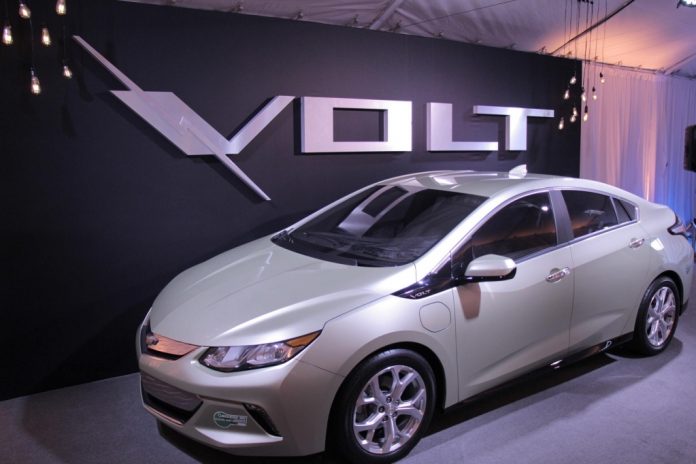Guest Post by Eric Peters

My teeth and gums are particularly sore today.
I read – and relate with sourness – that GM has achieved the miracle of reducing the charge-up time of the 2019 Chevy Volt to”only” 2.3 hours – assuming you can plug the thing in to a 240 Volt “fast” charger.
If not, the time to achieve the equivalent of a full tank is only 13 hours.
This is taken as progress in a world where that word invariable means regression.
Progress used to mean or at least be roughly synonymous with improvement. Thus, it would be considered an improvement if a car cost less, performed better or imposed fewer hassles on its owner.
Well, it would by the old standards of language.
We are supposed to cheer as “progress” a vehicle that takes literally orders of magnitude longer to recover its capability to move – the thing we expect a car to be able to do above everything else – than a car built 100 years ago took to recover its ability to move. Do the math. Call it two hours. That is 120 minutes. As opposed to the five minutes it takes to gas up a normal – a sane – car.
How many times does 5 go into 120?
Twenty four times.
That’s the best-case scenario, remember.
If you do not have access to 240 Volts – which most people don’t because it takes special wiring/infrastructure (which costs extra, too) – and have to plug into 120V instead, the recharge time more than quintuples. It takes literally half a day to recharge on household 120V current.
You don’t want to do that math.
Though maybe you should, given the hard push electrics and plug-in hybrids are being given by Uncle. You soon may have no choice about plugging-in.
And paying for it.
The car – and then the charge.
One of the anvils hanging over the collective heads of the electric car earnest – the starry-eyed fools who see these things as The Future – is the current absence of charge. Not the electricity but the having-to-pay-for it.
Many of the public charge stations are currently “free” – for now. It is a Tricky Dick (or Slick Willy, if you prefer a more . . . current reference) means of gulling the gullible into thinking – such a deal!
And none of the public chargers or the electricity piped into your home includes motor fuels taxes, as on gas and diesel.
Which of course it will have to at some point because it must. How else will the roads be paid for? If anything, electric cars accelerate wear and tear on roads because they weigh considerable more than their IC-engined counterparts. That fact will probably be factored into the taxes applied to electricity once the electric car thing really gets rolling – assuming it ever does. But without question, at least the equivalent of the current 50-something cents per gallon we pay in addition to paying for each gallon of gasoline or diesel will have to be applied to the kilowatt-hour equivalent of electricity.
That math will be unpleasant, too.
But there will be plenty of time to figure it all out. Using an abacus, if you like. There’s no hurry.
Ah, progress.
We pay more to wait longer and go not as far in cars that cost more.
And they ask me why I drink . . . .





For city-folk with a short (distance) commute, maybe it makes sense…….drive to work, plug in to charge………..drive home, plug in to charge. Bug Out in an emergency…….use a really long extension cord.
Ya, and city-slicker and libtard siblings go through the woods to grandpa’s house for Christmas and it’ll take weeks for them all to recharge before being able to leave his basement again.
The Volt also runs on gas. How does nobody seem to acknowledge this fact. It has the same range as anything else you put gas in.
I will not drive an electronic pregnant roller skate…..
I wonder if there is much of a used car market for any of the electric cars (like Tesla) or hybrids like the Volt. I imagine that the Prius has some decent history to establish what the used market is, not so sure about the Tesla or Volt. I am particularly interested in anyone who has some decent data or true anecdotes about the Volt. My guess is that you have to give them away when you do not want them anymore. Am I correct?
The secret with those cars lies in being rich enough that you don’t have to care.
Prius isnt a terrible used car idea if u are above average mechanically, its a robustly built car and can be had for cheap if the battery pack is shot. There are companies repairing the battery cells and you can replace the pack. It seems easier than swapping an engine in a typical 4cyl like a camry or civic.
Of course a prius is actually practical bc it has an IC engine.
There is. There was a business buying off lease 3 year old volts and renting them to city fleets and Uber/Lyft drivers. The better ones (good usage pattern based on data) were going for just under $10k. The new cars were way too expensive, so the vast majority of the early model year Volts were leased as opposed to purchased, and let’s just say the resale market couldn’t and didn’t take the flood that the new car market couldn’t take a few years earlier. A used volt in good shape for $10k makes a decent commuter for the right driver profile, especially if the family has a second car/SUV.
Pretty much. They tend to drop off pretty quickly. This is in part due to the artificially lower price created by government tax encentives. Feel how you want about that, but it has created a bit of a deal for used car buyers. The low end torque of electric motors makes this a decent little economy car for those of us who hate 4 cylinder cars driving dynamics. The other thing the author of this article has neglected to mention is that the range on electric only is just part of the car. The Volt is a stop gap between gas powered and electric cars in that it uses a gas generator to extend the range to that of any other gas powered vehicle. So you can put gas in the Volt and drive it like any other car if you want but you get the low end grunt of an electric car all the time. That said, most Volt owners do charge their cars and drive on pure electric around 80% of the time. As a used car the Volt makes sense, but for the price of a new one they aren’t a great choice financially.
Being an older than dirt reader, I dug into the archives and read up on GM’s earlier flirtation with electric cars in the 90s. Remember the EV1 (https://infogalactic.com/info/General_Motors_EV1)? Guess what? The recharge times and range for the EV1 are identical to that of the Chevy Volt (both for 120V and 240V)! Which goes to show that battery technology reached its practical limit a century ago. Electric powered vehicles have their place on the golf course, but not as a daily driver.
All this intravenous Eric Peters info-tainment makes me wanna piss like a racehorse.
Electric vehicles have proven themselves superior, they dominate our golf courses.
In any event, if someone wants a Volt and it works for them and their lifestyle, let them go out and buy one.
But also let them pay the full price of owning and operating them without the taxpayers having part of it dumped on them, the same way gas and diesel owners have to pay their full costs without any taxpayer subsidies.
Just to be a bit fair, special infrastructure (240 v) can be had by taking the hot side of two 120 v breakers. If your home is powered by a yellow extension cord from the neighbor’s shed, then maybe you might have trouble with 240v.
The article doesn’t mention how many AMPS you need for a charge in reasonable time. Imagine recharging your car using the hot side of two 120V breakers – that are set to pop off at 5 AMPS. Assuming the car isnb’t pulling any harder than that, it would still probably take overnight to charge.
What amperage does the car pull? How long does it take, pulling that amperage at 120V and 230 V? Can you do better if you keep it in a warm place instead of out in the Minneapolis snow? How much better?
Eventually, the truth comes out. And it usually isn’t found on EV websites.
The economy is going to grind to a halt if/when all your choices are renewables.
I’ve noticed electric cars emphasis speed not ‘horsepower’. Thus Tesla and other EV highlight their 0-60 performance, as if we are all still teenagers eager to squeal our tires when the light turns green assuming we have nobody in front of us. Still it might be useful if EV makers gave us the KW rating of their motors. Its how European cars horsepower is usually stated. Thus 774 watts= 1 hp.
We could then estimate approximately how much electricity we would consume to power a 150 hp EV for one hour and what that would do to our utility bill.
Stall torque on these motors is relatively low.
I’m a fan of the Volt. Unlike a hybrid that uses a gas motor to run a generator, the volt is an electric car with a gas motor backup, so if you run out of battery, you have an emergency power source that can easily get you home (or to a charging station). 2.5 hours is a very short recharge time, rendering it suitable for commuting. Peters is also full of shit about the power source. If you have an electric water heater, furnace, ac or a clothes dryer, then you have 240 V single phase power. Duh.
People tend to be nostalgic for things they never had. When I was young, I had a thing for pre-ww2 cars. I still love the styling of the late 30’s. However 6 x 16 non-radial tires sucked, there were no seat belts so in a frontal collision you would eat glass and most cars had less than 100 hp. Full sized cars. The national speed limit was 50 mph. Oh and try passing someone with 85 hp and a three on the tree manual transmission without synchromeshing gears. That’s okay, you can always swerve away from oncoming traffic on a rain slicked highway with those 6 x 16 tires (and a narrow road without shoulders). Welcome to travelling in 1950.
Peters loves old cars because he is too young to have been around when that’s all there were. Oh sure, some were great, but many were awful. While today’s cars easily go 250k without major repairs, 100k was about average 50 years ago. Tires lasted for about 15k miles while today they go 40-50k. I think it’s time for Peters walk the walk, to combine his love of obsolete technology with political incorrectness. The perfect car for him is a 1963 Chevy Corvair Monza.
 ?1333052016000
?1333052016000
PS. Friday while driving home from work, I spotted a cherry 1955 Chevy Nomad (that’s a rare two-door station wagon that has been popular with rodders since I was a kid). Beautiful car.
True, except you do probably have to run a new circuit & breaker and may run into system capacity issues. I think he means you probably don’t have an already wired outlet for 240 in your garage.
There are still many homes in this country w/ 60 Amp service.
I have a 200 amp service and load center installed in my home. It is fully populated. I live in Tennessee. I do not have an electric furnace but I do have HVAC, Dryer, Hot Tub, Electric Water Heater and a Sun Room with a motel style AC unit. I would have to scrap something to allow a 240 volt charging circuit. Additionally, I would have to run wiring to support the circuit. Also, I do not have a carport or garage, so any 240v charging outlet would be located on the front of the house.
No, no e v for me. Well, unless it is Natalie Portman! 😀
Actually the Corvair was a pretty damn good car. My neighbor had a 1965 4 door for years. It was very roomy, far more so than any “full size” car made today. It had dual carburetors, a 2 speed power-glide transmission, and according to him that thing would get as high as 28 mpg on the highway. Oh sure, I suppose other 6 cylinder cars get 28mpg today (They’ve about phased out 6’s, all you can get for most models are harmonically imbalanced rattly-ass 4 cylinder pieces of shit), but this Corvair didn’t have any modern problems like, ” well one fuel pump costs $600 or the other one costs $2000 to fix, we just don’t know which one is bad yet”, or ” your transmission rebuild will cost over $8000″, and “well, that solenoid that controls the fuel management system has failed and is located down around the cam shaft, and it will cost $2000 to fix it. It’s a Chinese part you know, they go bad all the time!”
No, it was a very smooth and quiet running car that got great gas mileage and had plenty of room. I’d buy one today if they made it, and its inflation-adjusted price would be around $17,000.
Here in the land of fruits and nuts there are EV charging stations scattered here and about for free use by EV “owners” (usually lessors). LAPD’s Harbor Division is across the street from the terminal where I work and they have half a dozen “free” charging stations in the parking lot. A 4 hour time limit applies.
There are a few co-workers who park there in the morning, charge up for a few hours then go get them at break or lunch time and park at the terminal.
It’s a great gift provided by the taxpayers to people who make ~$100k/year.
Greetings,
I was in a flame war last year with some clown that couldn’t do math with regards to the cost of running an EV for nothing more than a typical commute. I only used manufacturers rosy numbers and the Department of Energy to get household energy use. Here is what I found.
The Chevy Volt requires as much energy to complete a 30 mile each way commute as a typical home uses in a 24 hour period. Since only 2% of our electricity come from renewables, that means that the Volt has to gets its electricity from burning something and in many parts of the country the thing they are burning is coal. In other words, you can think of a Chevy Volt as a coal fired house moving down the freeway.
To add insult to injury, since 1/2 of the electric vehicles in the nation are in California, our governor has placed all kinds of new taxes and fees on the electric vehicle. The plan is to squeeze an extra 52 Billion in fees out of the EV owners in the next ten years. Ouch.
Finally, I do not see much of any resale market in these vehicles as they are nothing more than a moving battery running a computer that uses proprietary everything. When Tesla goes out of business, do you think there is any inventory of those proprietary parts? Good luck keeping your 100k paperweight moving.
Nickel! +1000
Damn right dude! Love it!
This is what you call a real car engine. It’s a 214 cubic inch inline eight that runs on about 3 lbs. of oil pressure (splash oil system, just like the Briggs & Stratton lawnmower engines). It uses an updraft carburetor that’s impossible to flood, and doesn’t use a fuel pump in the modern sense (it’s called a vacuum fuel transfer canister that can be rebuilt for under $50 and you don’t have to take the engine apart to fix it. )
This is essentially an 8 cylinder water cooled lawnmower engine. Please note that it runs quieter than just about any engine built today.
Meanwhile I can fill the tank of my eco-unfriendly Camry that gets 34 mpg in less than 5 minutes. Not only that, but there is generally a liquid “recharging” station on nearly every corner, and when I am on the highway in unfamiliar territory, the government goons have provided their crony-capitalist partners with the means to advertise their stations on easy-to-read signs at every exit.
But hey, there’s a 240v charging station off every exit and a place for me to hang out for 2-13 hours…right?
I found out a couple weeks ago that many new cars use a fob instead of a key. If the fob is in (or just near enough) the car you push a button and the car starts. (Since I have a 14 year old vehicle this was news to me.) The information that the Chevy Volt was one of the cars with a fob instead of a key came to my attention when I spent a half hour helping a woman search our garage sale because her Chevy Volt wouldn’t start without the fob. The fob was no where to be found. She finally decided that she must have either left it at home in the garage or dropped it when she got out of the car to get her mail. My brother, who only has Fords, assured me that the car wouldn’t go more than a few feet without the fob because what idiot would design a car without a safeguard to prevent it from being driven away from your means of starting it? Apparently the idiots at GM.
Electric car charged by a coal fired power plant …. just can’t make this shit up.
Charge time doesn’t really matter when the average US round-trip commute is 50 miles or less, and the car can charge while you sleep. Can a gas car fill itself up to a full tank every morning while you sleep?
At least someone else gets it. Didn’t you hear though? The Volt isn’t progress in any way that the author defined… Which are obviously the only parameters that matter. I don’t get the hate for electric cars. I get the hate for tax encentives but not the cars. Electrics are quiet, great off the line, and offer a low center of gravity. I’d take a volt over a camry any day. If they made an electric with equivalent performance and handling to a sports car that wasn’t overly expensive then I’d get one instead of a Vette. As it is right now though, the Vette wins out for me.